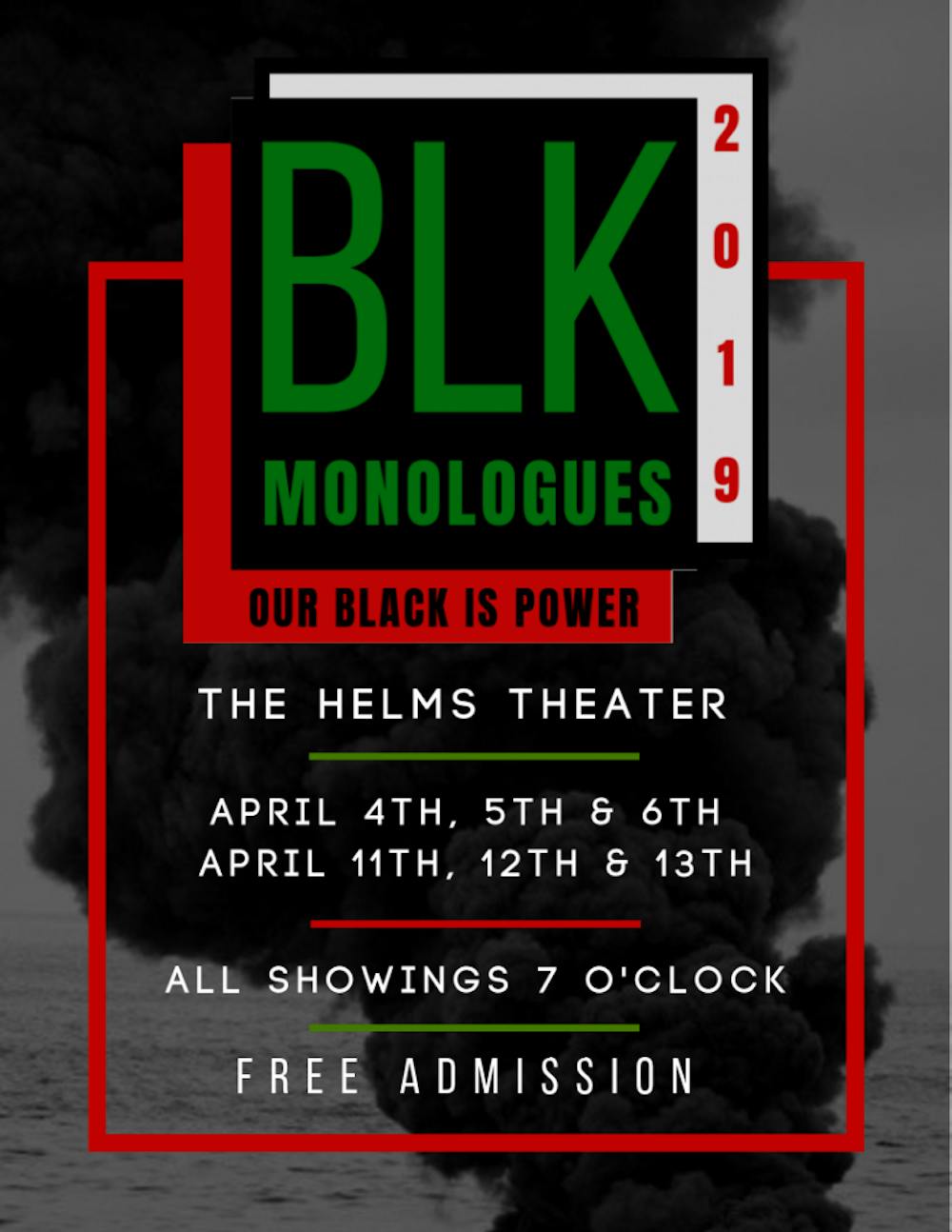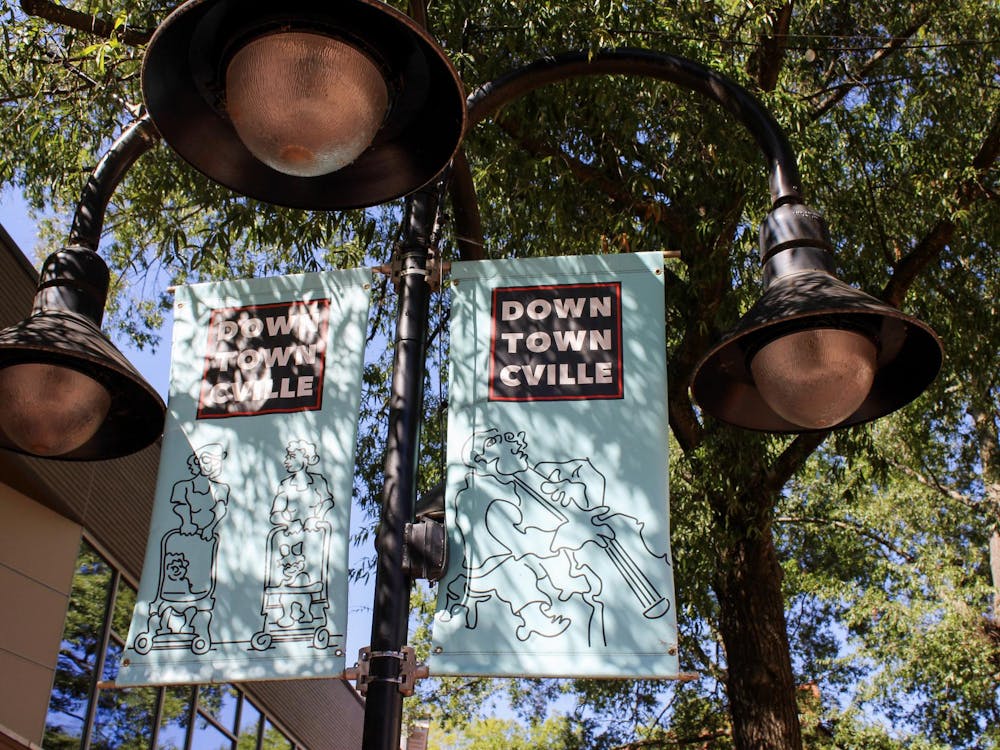It’s that time of year again — the time of year when the Helms Theatre opens its doors for six performances over the course of two weekends. The time of year when those six performances consistently sell out days in advance, and students swarm the box office for the chance of snagging spare tickets. The time of year when an unembellished stage is transformed into platform to proclaim black love, bemoan black injustices and celebrate every facet of black identity. The Black Monologues have returned.
Although the actual time of year has changed, moving from the usual October date to April — neither the cast nor the audience were deterred by the switch. Students still came out in droves each night of the Monologues, ready to experience the latest round of immersive, impactful black essays and skits.
The theme of this year’s Monologues, the production’s fourth iteration at the University, was “This is a Black Space.” The presentations were broken into three parts, or “Peaces” — Powerful Consciousness, Loss of Power and Where Do We Find Empowerment? As the titles suggest, the overall trajectory of the performance is coming to terms with blackness, feeling helpless as a result and finding a way to overcome that helplessness.
Fourth-year College student Tiara Mai Sparrow directed the Monologues and alumna Branika Scott assistant directed. Both Sparrow and Scott have been involved with the theater tradition since its start at the University four years ago.
Aside from the switch to the spring semester, the Monologues also employed a different setup in Helms. In previous years, the audience was arranged in rows bordering a stage centered in the room. For this year’s production, the rows of chairs were more elevated and uniformly arranged, facing the stage on the opposite side of the theater.
The layout felt more isolated, less intimate than the old, in-your-face setup — but, as always, the Monologues found a way to innovate. From opening performance “What Does It Mean To Be Black?,” in which actors planted in the audience burst forth to give their varying answers to the titular question, to multiple skits in which the audience was encouraged to dance, sing or participate in call-and-responses, the space became just as jocular as ever.
It wasn’t all fun, though — in keeping with the spirit of the Monologues, at least a third of the content involved deadly serious, sometimes heart-wrenching material. The heavier tone was exemplified in pieces such as “For Black People Who Don’t Swim” and “Try Me,” both of which dealt with the violence, discrimination and suppression black people have historically experienced in America. In “Try Me,” fourth-year College student standout Rianne Mitchel described her “people being used as targets in a nationwide shooting range.” In “For Black People Who Don’t Swim,” first-year College student Alexander Benjamin and second-year College student Kayla Hess dove into the myriad implications that water could have for a Black American, drawing creative connections between Emmett Till’s water-bloated body and segregated water fountains.
Some of the most powerful pieces, though, were the ones which managed to blend the humor and horror. In “I LOVE It Here,” hilarious second-year College student Tanner Phipps donned an orange hoodie — breaking from the black-and-red wardrobe of his peers — and gave a glib, over-the-top tour to prospective students, glossing over the racist details of the University’s past. Only when the tour ended could he remove the hoodie and with it the cheery act, emotionally acknowledging the University’s enslaved construction workers whose remains are literally under his feet.
Phipps’ performances were highlights, brilliantly toeing a tragicomic line. In “The Hood,” he made the Freudian slip of calling urban renewal “Negro removal.” To every monologue he was featured in, he brought an infectious energy — whether positive or negative.
The same can be said of Mitchel, whose relentlessly intense stage presence was furthered by an incredible singing voice, to be used at choice moments in the Monologues. While last year’s program featured dance segues, this year Mitchel led her castmates in powerfully harmonious songs — the most unforgettable being a rendition of the “Good Ol’ Song” which ended with, “Let’s all join hands and thank the slaves / That built old U.Va.”
One of the greatest strengths of the Black Monologues — and the aspect that makes it most difficult to write about — is that every speech, every cast member deserves praise. This production, while already a renowned tradition in the University arts community, defies traditionalism whenever possible.
From year to year, nothing feels recycled, borrowed or redundant. This isn’t some Shakespeare production in which a new twist attempts to revive a tired tale — although there is an excellent “Othello” joke tucked into one of the sketches. These are the Black Monologues — a genuine, vibrant representation of an overlooked demographic at the University.
In the final presentation of the night, “Our Blackness Is…,” third-year College student Brittney Ogbonna defined her blackness as the “force that inspires me to be unapologetically authentic.”
The Black Monologues are unapologetically authentic. They transform a space in which, if you’re an audience member, speaking or making noise of any sort is traditionally taboo. At what other theater production can you snap, shout encouragement, sing along and dance in the aisles? The interactive nature of the Monologues lend them the force of a religious experience, something that was capitalized on this year in penultimate performance “God Instilled Messages.” Benjamin donned black robes while the actresses laid bonnets in their laps, and he preached to the congregation — the congregation being both his fellow cast members and the audience.
Not only are the Monologues unapologetically authentic — they are also unapologetically black. “To be black in America is to have your speech ripped from your throat,” said one cast member in the opening skit. The Monologues are a reclamation of speech. They aren’t meant to pander to a larger, white community, even though the demographics of a typical Monologues audience tend to mirror the skewed demographics of the University. They are created to celebrate the identities of their authors and actors.
Authentic and black — two unusual descriptors in a setting which feels more contrived and artificial by the day, and which is very obviously white. For anyone dissatisfied or bored with the University’s artistic offerings, the Black Monologues are essential.







